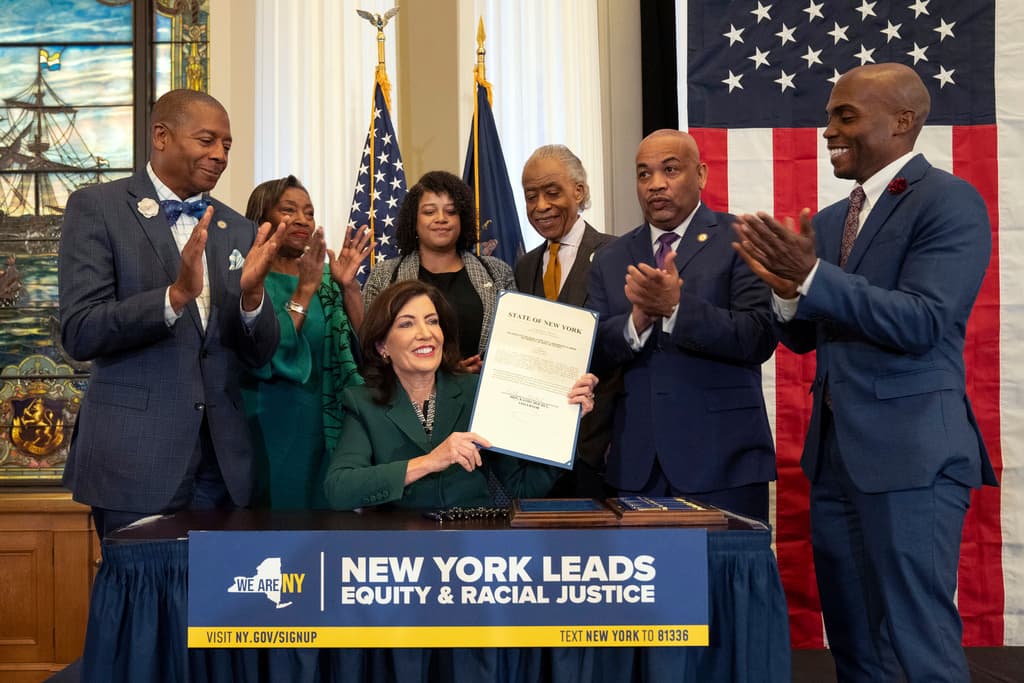New York Reparations Commission To Meet as Its One-Year Clock Ticks
As state and local efforts progress, the recently released Democratic party platform further brings attention to the topic by emphasizing the need to study reparations on a national scale.

New York state’s reparations commission will meet next week, in a sign of the commission’s efforts to make progress as the one-year clock is ticking for it to come up with a report of recommendations that could help shape future New York policy on the issue.
The meeting comes as reparations have been gaining traction and garnering national attention — most recently, the Democratic National Committee’s 92-page platform, in its section on pursuing racial equity, highlights the party’s focus on studying reparations on a nationwide scale.
“We have a long way to go to realize the full promise of America, but we are committed as a party to continuing the work to build a nation where all people are not only created equal, but treated equally throughout their lives,” the platform reads. “To determine how best to right historical wrongs, Democrats support Congress executing a study of reparations and the continuing impacts of slavery.”
Meanwhile, states and localities have been forming and bolstering committees to study reparations. In June, Chicago launched a reparations task force with the goal of acknowledging the city’s “legacy of slavery and its aftermath,” and Illinois’ state reparations commission began a series of public hearings across the state in July to gather input from residents on reparations.
Detroit’s reparations task force, too, has been seeking public feedback by asking residents whether they support measures such as providing cash payments to Black residents, grants of up to $40,000 for a down payment, “granting city land to Black Detroiters at no charge,” and “eliminating the overcriminalization of Black residents for petty crimes like loitering and littering.”
On a state level, three major California reparations bills recently passed committee last week and are advancing to a full Assembly vote, in what its sponsor, state Senator Steven Bradford, said was a “step closer to placing these historic bills on Governor Newsom’s desk.” The bills aim to create an agency to administer future reparations, compensate Black residents for land taken by eminent domain, and establish a state treasury account for future funding of reparations initiatives. California entered the Union as a free state and sent the highest per-capita number of soldiers to fight for the North during the Civil War, as the Sun has noted.
New York’s commission — established through legislation signed by Governor Hochul— held its first public meeting at the end of July, where members discussed its initial goals and discussed the importance of hiring staff and preparing for legal challenges and “minefields.”
“We’re going to need some legal support,” one commission member, Lurie Daniel Favors, said at the meeting. “Particularly because this is a very litigious area and there are a lot of folks who are looking for any reason possible to shoot down what we are doing,” she said, while noting the Supreme Court’s banning of affirmative action at colleges. That decision has prompted a wave of legal concern over whether race-based programs in general are constitutional, and the nation’s first reparations program, in Evanston, Illinois, is currently facing a lawsuit from non-Black residents who argue that the payments are discriminatory.
It’s not yet clear whether New York’s commission will advocate for direct cash payments or other forms of compensation.
During its initial meeting, the commission successfully elected its chairwoman but had several heated moments as it was unable to agree on a vice chair since one commission member was not present. The state legislation that set up the commission had specified that the commission was to elect both a chair and vice chair “no later than the first meeting” — and the commission’s failure to complete that task appeared to upset several attendees.
“What was today’s mission?” one attendee asked, adding that “we didn’t accomplish that today.”
“It’s a short time frame, it’s a very short time frame to get the work done that you need to get done,” he said.
“This is the first meeting and already there’s a lot of miscommunication,” another attendee told the commission. “Just seeing this meeting right now there’s a lot of concerns already that I have.”
The commission’s upcoming meeting, which will be held at the Empire State Plaza at Albany, is open to the public and will be livestreamed.

